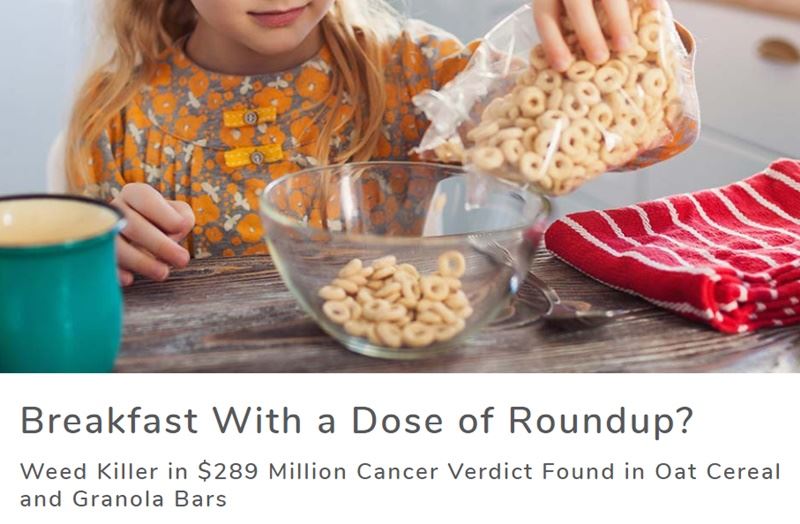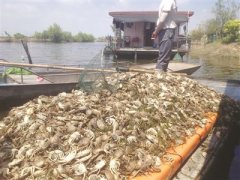American public health organization: Quaker Kale's breakfast crisps oats contain carcinogenic herbicides
A public health organization in the United States said that its latest study found that a series of breakfast crisps, oatmeal, snack bars and other products popular with American children have detected the over-standard carcinogenic herbicide "Jiaposai", and there is no lack of well-known brands.

The British newspaper The Guardian reported that the public health organization Environmental working Group (Environmental Working Group,EWG) found 43 samples of oatmeal samples containing gabion plugs. Jiaposai is the main ingredient in the popular herbicide brand Roundup (or spring every year).
According to the data published on the EWG website, a total of 45 traditional samples and 16 organic samples were tested. Of the 16 organic samples, 5 were found to contain gabion plug, but none of them exceeded the 160ppb health standard recognized by EWG, but 43 of 45 traditional samples were found to contain garnet, and 31 samples exceeded the standard.
EWG said some of the products that exceeded the standard came from Quaker, Kellogg's and General Mills, which makes Cheerios.
A spokesman for General Mills and Kellogg said that their food is safe and meets the strict food safety standards laid down by the US Environmental Protection Agency (EPA). Quaker also said that the safety and quality of the products are enough to reassure consumers.
However, EWG said that manufacturers follow long-outdated federal standards, most of the products tested exceed the standards, and more stringent safety standards for gabion content must be set.
Ken Cook, chairman of EWG, said: "No one wants to eat herbicide for breakfast, and people should not eat it." Cook said they would urge the EPA to restrict the use of garnet for food crops, but companies should act on their own initiative because of concerns about the "lawlessness" of the Trump administration's oversight mechanism.
Before EWG released the study, a court in San Francisco ordered Monsanto to compensate a 46-year-old former gardener whose cancer was caused by Monsanto's annual spring herbicide and that Monsanto neglected to warn each other of the risk of exposure to the herbicide environment.
According to the Guardian, emails from within the US Food and Drug Administration (FDA) in April showed that scientists found caproate plugs in most daily foods and found it difficult to find foods without them. FDA has not issued any official statement on this, but there is no indication that the claim is related to products outside the United States.
- Prev

Shandong Bambo Chemical fake Drug killing stick accused of inferior Pesticide arrest of extremely fake and shoddy Pesticide
According to a report by the agricultural administrative law enforcement brigade of Xianju County, Zhejiang Province, a fake pesticide case was recently seized in the county. In October 2017, the Agricultural Bureau of Xianju County extracted methylaminoavermectin benzoate, which was labeled as the killing stick, in the action of fighting counterfeiting of agricultural materials with Green Sword.
- Next

Sihong County Hongze Lake ten thousand mu fish crab dead black sewage continuously poured in
Affected by recent heavy rainfall, a large amount of upstream sewage flows into Hongze Lake. Since the early morning of the 25th, the water quality has deteriorated seriously. As of 5 pm on the 28th, about 31,000 mu of breeding area in Linhuai Town, Sihong County has been seriously affected, including 160 crab households in Shengli Village, Linhuai Town, located on an island in the lake.
Related
- A one-day flower show brings 130 million yuan in orders! Nanhai, this Phalaenopsis exhibition is amazing
- What do the flower language and meaning of Lutheran tree mean? Precautions for planting Lutheran tree
- Encounter Chaoshan Kongfu tea, not without this cup of Phoenix single clump
- The durian market in Vietnam and Thailand is flooded. The price of imported durian has plummeted by 30-40% in a month.
- Shanghai solved the problem of local vegetable supply by planting 80,000 mu of green leafy vegetables.
- Wageningen University has become the best agricultural university in the world for the seventh time in a row.
- The strongest export season of South African grapes is full of challenges, with exports to Russia falling sharply by 21%.
- Sri Lanka is on the verge of bankruptcy, "Tea for debt" Organic Agriculture Revolution aggravates the Food crisis?
- Turning waste into earthworm manure and worm manure into organic fertilizer-A new choice for auxiliary farming
- Organic rice growers shoulder the responsibility of nurturing agricultural talents! Yinchuan Sustainable Farm with Organic Life Camp

